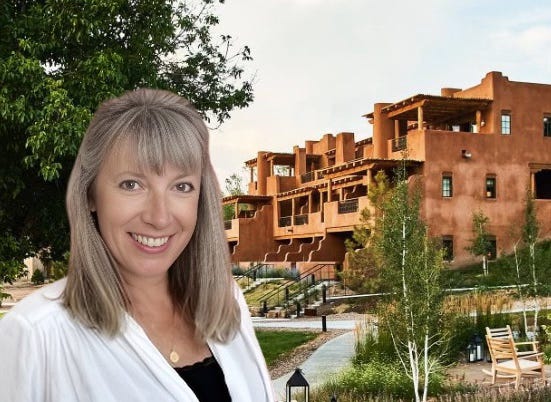When Wonder Twins, Local Activism & Superpowers Unite
“Wonder Twin powers, activate!”
I was a latchkey kid of the 1970s and 80s. This means I watched a lot of TV.
This line echoed in my head while reflecting on last week.
I could hear the voices and how the line was said. But I had to take to Google to remind me who said it. Ah, yes—Zan & Jayna, otherwise known as the Wonder Twins. They always saved the day by joining forces to fight some new form of injustice.

Each has unique superpowers.
Zan can transform into any form of water—solid, liquid, or gas. Jayna can transform into any animal. After fist-bumping and speaking their iconic line, they each reveal the form they’ll take in their fight.
What do twins from the fictional planet Exxor know that most of us don’t?
They know their superpowers.
And that they are best used jointly.
Back to planet Earth and the events of last week.
There’s been a lot of drama in our village. In response to a newly installed state-of-the-art water treatment facility at the resort adjacent to our small neighborhood, a group of village residents have been protesting. They’ve petitioned to deny the government’s renewal of the permit. Last week, a hearing took place at our state capitol.
My neighbors and I have a keen interest in the new facility. It follows the same award-winning technology used in a pueblo casino across the valley. We want the best technology—community health and the environment are everyone’s priority.
Because our little neighborhood pipes into this facility, we also share in the financial cost. And when you make a big investment, you ask a lot of questions. You read the documents, you tour the facility. We want a system that not only meets governmental standards, but exceeds them. We’re pleased to see excellent testing results.
My husband Bob and I, along with a dozen people from our neighborhood, attended the public hearing.
We attended in support of the resort. Because we’re frustrated with the growing flurry of falsehoods and fear tactics. Because we’re trying to understand the protestors’ underlying concern. A mediated proceeding seems the best route.
My take is that the protestors have a broader concern with the requirements of state-level laws. Are they measuring enough? Are the requirements stringent enough? Honestly, I don’t know the answers to these questions—it’s not something I’ve gone diving into.
Because it’s not the matter at hand.
Let’s just say I now know more about sewage treatment than I ever thought I would. And I feel pretty good about the state’s diligence in approving this permit.
But something happened in the first 30 minutes of the hearing.
The protesting attorney arrived with no expert witnesses. His backing was a sizable number of village supporters. His verbal case rested on the “known unknowns”—the hazardous waste (ranging from turpentine to medical waste to metals) my neighbors and I might put down our drains, escaping the capabilities of this domestic sewerage system and potentially contaminating the local creek. His suggestion was echoed by protestors making public comments.
Suddenly, my neighbors and I were not just listeners and supporters.
We were the suspected perpetrators.
When injustice becomes personal, it changes everything.
Like Zan and Jayna, I know my superpowers.
I’m good at many things—analytics, strategy, research, marketing and sales.
That makes me good in many roles—for example, I make a good board member.
Though often asked to be, I tend to say no. Because others would also be great in the role.
One of my superpowers is rallying people around a cause I know they care about. I make it easy. I can jump into activation mode.
And when I do, they do.
I know not everyone has my superpower. I need the open space to use it when needed.

On day one of the hearing, my small group of neighbors and I surmised two things.
First, with the protestors’ attorney having no expert witnesses, the hearing would wrap quickly.
Second, the only way to counter his key assertion that someone from our neighborhood might dump hazardous waste down our sewers (and yes, that is illegal) was for as many of us as possible to certify that we have not and would not do so.
Then I activated my superpower.
Not in a loud Wonder Twins proclaimation. But quietly.
I spent the afternoon and evening on my computer and phone.
I wrote my own public statement. I submitted it to the online public comment portal. I would speak it the next day.
I emphasized my family’s personal diligence behind our investment in the water treatment facility. I stated we have and would only dispose of domestic waste—and that the idea we would dump hazardous waste was insulting.
I called, texted and emailed my neighbors who had attended the hearing. We left ready to mobilize and get the word out. I wanted to continue our momentum.
Neighbors helped other neighbors wordsmith their own statements. We called neighbors unable to attend. We shared a basic statement I prepared that anyone could submit in writing as public comment.
The next day’s hearing began with an open public comment period.
I watched in awe as my neighbors brought their unique backgrounds—as scientists, environmentalists, architects, investors, political experts and teachers—to a parade of spoken statements. They shared facts and diligence-based narratives.
One person’s words inspired another’s. And another. And another.
I remarked to Bob that after five years, I felt like I really knew our neighbors.
Closing arguments were made and the hearing wrapped.
But we weren’t done. The written public comment portal would be open until the morning.
I went home and crafted an email. I sent it to as many neighbors as I had emails for. Our HOA president forwarded it to the full list.
The first line was from the heart:
“I just want to say that I am really proud of our neighborhood for using our voices and standing up for science, the law, and facts.”
The email updated people on what had transpired, asked them to submit a comment by the impending deadline, and provided the link and sample language to cut/paste.
I watched overnight as new submissions to the portal were posted. There was a parade of written statements from my neighbors—some decade-long residents, some currently out-of-state, some with homes still under construction.
Some were simple. Some longer and elegant.
By the next morning’s deadline, I counted 30.
Holy crap.
We expect that we’ll hear a decision on the hearing within 60 days.
But for us, the results are already in. In 48 hours, we learned two big lessons:
- Injustice Can Unite. We are a neighborhood of people of different backgrounds, politics, age, level of wealth. Some live here full-time, others do not. Some have lived in our state for decades, others recently moved here. We were a collection of individuals. Now we’re a unit. We’re a different neighborhood than last week.
- Know Your Superpower. I know my superpower, and I had no question this was the time to use it. You don’t have to hold a certain title. You don’t have to ask permission. The neighborhood email came from me as just a regular neighbor. Re-shared by the HOA board president, it was arguably more impactful than if he had written himself. He knew that, too.
Regardless of the hearing outcome, we clearly have a divide to bridge among residents of the broader village.
I’m not sure how that happens. I only know it will take time, finesse and collaboration.
I’m confident this special superpower resides among us.
It’s just waiting to be activated.
Venturing is all about knowing your story and superpowers—and using them towards the impact you wish to see. Learn more about success coaching and venture travel at JodiMorris.co. Subscribe to my Substack Let’s Venture for inspiration to unlock your superpowers!
